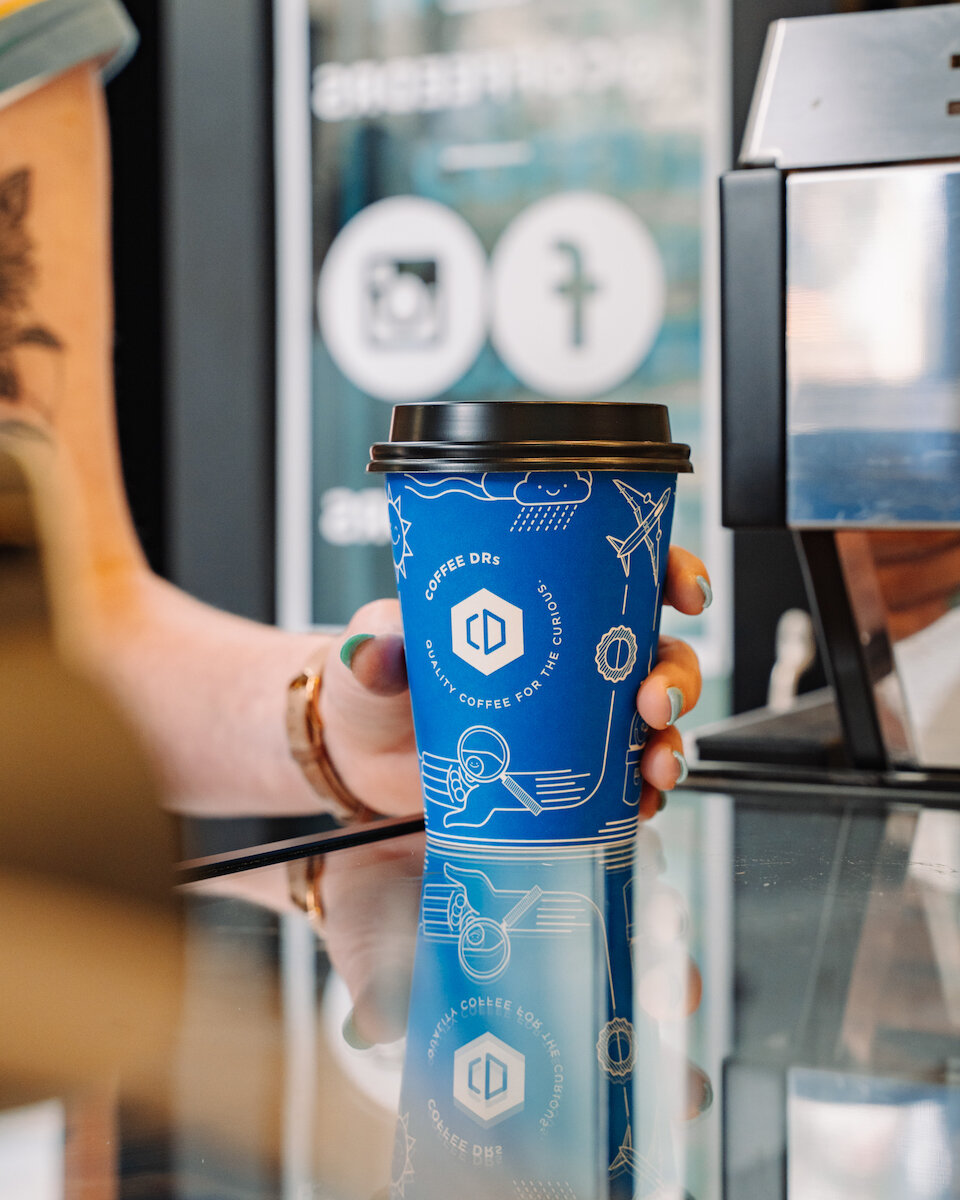Introducing Our New (But Still Blue) Compostable Coffee Cups
Our Biopak compostable coffee cups have arrived here at Coffee DRs, and honestly, it’s a bit like Christmas morning. We’re thrilled to be able to be doing a little bit more to look after our environment, while still providing our signature brand of excellent coffee with quick service
Of course, there’s been a lot of media hype about compostable plastics. Are they really compostable, or will they eventually end up on a landfill (if we’re lucky) or polluting the environment (if we’re not)?
Well here’s what we know and why we support the thoughtful, reasonable use of compostable coffee cups.
What are Compostable Coffee Cups?
Compostable plastic (and compostable coffee cups) is simply plastic that has been developed to biodegrade in an industrial composting facility. In order to be certified as ‘compostable plastic’ under Australian Standards, the plastic needs to 90% biodegrade to a smaller than 2mm within 12 weeks, 90% biodegrade completely within 180 days, have no toxic effects on plants or earthworms, should not contain hazardous materials and be made with more than 50% organic materials.
What About Home Composting?
Home composting is another step further along the compostable plastic trail, because not all ‘compostable plastics’ are actually home compostable plastics. Conditions in our home composts are different than industrial conditions – they’re more variable and less robust – which can make it harder for plastics to completely break down. And that requires the plastic to be able to biodegrade under those less consistent conditions.
Benefits of Compostable Plastics
Compostable plastics have a many benefits for our economy.
Helps divert organic waste from landfill. ‘Recyclable’ food packaging is often diverted to landfill simply because the food waste contaminates the packaging. And reusable coffee cups – whether made of glass or plastic, often end up in landfill once they reach the end of their usable lives. With compostable packaging, food waste, and the package itself, can both go into the compost bin as part of the circular economy.
Reduces greenhouse gas emissions from organics. Composting reduces the greenhouse gases that are released from landfills, and sequesters carbon from the atmosphere and locks it in the soil.
Made from plant-based, renewable materials. Plant-based materials are not only compostable, but they are also renewable, and once they are broken down, return vital nutrients to the soil.
Reduces dependency on fossil fuels which are a limited resource.
Can be recycled into nutrient-rich compost, enhancing soil quality and structure.
Our Biopak Coffee Cups
Our new (of course blue) Biopak coffee cups are certified compostable coffee cups. That means they completely biodegrade in commercial compost facilities, in this case, within 120 days. Better yet, they’ve also been shown by customers to be compostable under home conditions as well. And that means they’re a great choice for your favourite cuppa.
How to compost your Biopak coffee cup at home.
Biopak coffee cups need a well-managed home composting system with the proper mix of green and brown materials, aeration and moistness. Of course, composting is definitely an article itself (if not much, much more). But here are our quick tips for composting your Biopak coffee cups at home:
Pick a dry, shady spot for your bin or pile.
Rip or shred the coffee cups.
Bury or mix the pieces into the centre of the bin.
Moisten dry materials (and the coffee cup pieces) as they’re added.
When the material at the bottom is dark and rich in colour, your compost is ready to use!
How to compost your Biopak coffee cup commercially.
Biopak cups are designed to compost commercially, and will have no problem breaking down in a commercial facility. You simply need to find the closest facility and drop off your cups (just like heading to the tip!). You can find out information about your closest commercial composting facility here at ‘Find a Composter’.
Disposing your Biopak coffee cup in your green bins.
As part of the circular economy, certified compostable plastics can be disposed of directly in your green waste bins at home. This is a great alternative if you don’t have a home compost bin, or you don’t make enough green waste to keep your home compost bin active enough.
And if you don’t have a green bin for organic waste, Biopak have a free compost service designed to close the loop on the circular economy, divert waste from landfill and stop plastic pollution. This helps us all move towards the ultimate goal of a zero waste economy.
Keep Working Towards Zero Waste Every Day
At the end of the day, it’s our goal to keep working towards zero waste every day, and composting (and compostable coffee cups) are a great way to do that. Zero waste is better for the community, leaves the earth better than we found it and lets people benefit from each other in the best way.
Composting our cups and lids at home or in a commercial environment is an awesome step. But there are a lot of other ways. Don’t forget to store your coffee beans in our special coffee tins which eliminates the use of plastics and wraps. Make your coffees at home and use the grounds as a coffee scrub (or even pop it into the compost as well!). And buy your coffee beans from producers that use sustainable processes in their coffee production. Each of these things will help you move towards that zero waste goal that we all should be striving for.
When you come into Coffee DRs, and grab one of our delicious single-origin or house blends, you’ll be drinking it out of a product that’s at least better for the environment. Just make sure to pop into a compost bin when you’re done!
Come into the shop and check out our new coffee cups. Or you can always just order delicious bean from our shop… we don’t mind.

